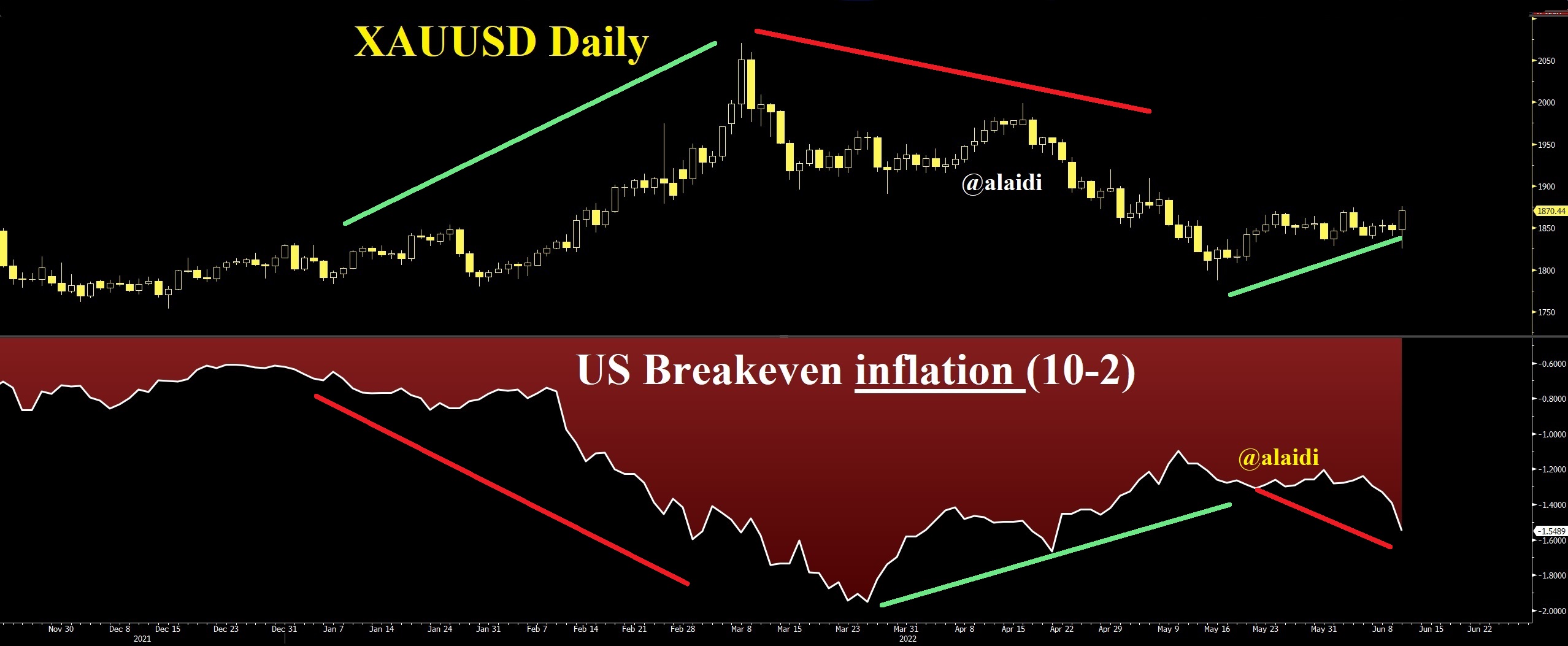US inflation hit a new 41-year high of 8.6%, bond yields surged back towards their 4-year high of 2.0%, so why did gold did rally $50 to $1870?
Those who say “gold is a hedge against inflation, therefore gold must rise” are conveniently ignoring the dangers of surging yields to the yellow metal. Remember this time last year, when gold broke down on the mere mention of taper? Now, the Fed has not only ended QE, but is widely expected to raise rates by at least an additional 200 bps this year, not to forget QT (selling the assets it bought 2 years ago).
NOTE: if you made money going “long gold” this week you will read this piece differently from those who lost betting against the metal. That's how the mind usually works. Here is my take on the 3 possible reasons for the rally in gold.

The 1st reason is obvious, the 2nd not so obvious, and the 3rd reason needs some thinking.
1. Slowing Core Inflation
One possible reason (not the best reason) is that annual core inflation slowed to 6.0% in May from 6.0%, posting its 2nd straight monthly decline.
This may not be so significant due to base factors and the removal of surging energy prices. But it may be telling us that inflation is starting to consolidate, when removing energy factors.
2. Declining Consumer Sentiment
The better explanation for the surge in metals is what emerged 90 mins after the release of the CPI. The University of Michigan consumer sentiment plunged to a record low of 50.2 in June from 58.4, highlighting people's pessimism with surging fuel prices, broad rise in inflation (food, transports, shelter and health), and tumbling wealth effect from stocks and bonds.
When the consumer is suffering at the same time the Fed is expected to raise rates by 150-bps between next week and September, gold traders have to cheer. Why?
They're anticipating either a policy error by the Fed (hiking too much forcing them to backtrack on rates), or Fed pausing for an extended period of time. Either outcome, should see inflation peak or pull down modestly, but not as fast as the decline as bond yields. Such an outcome would be negative for real bond yields.
Should we wait for the Conference Board's own index of consumer confidence on June 28, which is so far after next week's Fed decision? Let's see.
3. Breakeven Inflation
How about a 3rd reason (far from obvious) to the rise in gold? Let's consider breakeven inflation, which is the difference between nominal bond yields and the real yield on an inflation-linked bond (designed to make up for the extent to which the yield exceeds inflation).
As gasoline prices picked up fresh momentum two weeks ago, inflation expectations rose across the breakeven curve. More on breakevens here.
Most specifically, 2-year breakeven inflation has accelerated its pace of advance relative to 10 and 5 year breakevens, highlighting the urgency to which inflation is gaining in the short-term horizon.
And so in order to highlight the difference between near-term and longer-term inflation expectations, I plotted the 10-2 inflation spread against gold, showing how the decline in the inflation spread (jump in 2-year over 10-year) feeds into higher gold prices.
Regardless of whether the Fed hikes through the autumn or not, gold will stick around for the eventual Fed capitulation.
First Positive Signal Since April 2020
Many of your are tempted to short indices on Fed week, with the intention to target the lows of May 20/21. The problem with this, is the ensuing volatility. How deep will the whipsaws be?
Between the rate hike, dissents, Fed dot plot, and Powell's presser, it will be violent. But there's a trade that's fairly inversely correlated with indices (-0.4) without the volatility of indices or the JPY (no, it is not a JPY or AUD or CAD cross).
We stuck to it with the WhatsApp Broadcast Group over the past 4 weeks and it has continuously delivered. More importantly, it's just given me a crucially positive signal for the 1st time since April 2020.
